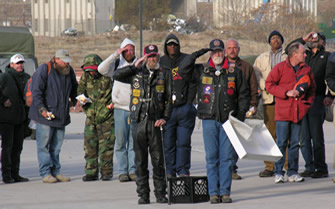|

Substance Abuse in Veterans
Their
tour of duty has ended but for thousands of servicemen and women, the battle for sanity can last a lifetime. Substance abuse
and PTSD takes it toll on our veterans.
In a 2003 report, Veteran Affairs (VA) in the U.S. reported that 81% of veterans
had a serious psychiatric or substance abuse disorder. 33% suffered from both. Although accurate numbers are difficult to
verify, the VA estimates that nearly 200,000 veterans are homeless on any given night, 42 % of those served in Vietnam.
Kathie Costos an IFOC
Senior Ordained Chaplain has spent twenty-five years of her life dedicated to helping those American servicemen and women
who fought for freedom and democracy. Ms. Costos states: “Veterans are misdiagnosed as being alcoholic or drug addicts,
but the truth is they are not addicted to the chemicals.” She says that veterans are seeking relief from the pain that
combat has left them with. Ms. Costos also says that many veterans are treated as addicts without getting to the root of the
real problem, post traumatic stress disorder.
Veteran homelessness and addictions for many go hand-in-hand. Some of those end up as suicide statistics. On November 15,
2007 Timesonline reported that 6,256 US Veterans committed suicide in 2005. An interesting comparison is that 3,863 Americans
lost their lives in military combat in Iraq since the 2003 invasion.
What can you do?
If you know of a veteran who is in serious crisis, have them call the VA Suicide Hotline at 1-800-273-8255.
As Senator Obama stated in a speech on May 12, 2008, “What must unify us as Americans is an unyielding commitment
to the men and women who served this nation and an unshakable fidelity to the ideals for which they risked their lives. Without
that commitment many of us would not have been here today and I am one of those people.”

Veterans become homeless & are at risk for homelessness for the same
reasons
as non-veterans, including due to the rising foreclosure* and
unemployment rates, as well as
due to veteran specific issues. Mental
Health issues (e.g., PTSD, mood disorders & substance use) have been
deemed
among the primary risks for homelessness among veterans.**
The effects of PTSD, including addiction, interpersonal problems & job loss,
were also associated with homelessness. The effects of combat exposure do not disappear as the years go by. Recent studies
reveal that 10% of Vietnam veterans still suffer from severe PTSD symptoms & that their combat exposure continues to place
them at risk for negative social & psychological consequences.
The NCHV's Iraq Veteran Project & others have reported that OIF/OEF vets are in serious danger for homelessness &
chronic homelessness. One source reported that in 2007 the DVA had identified more than 1,000 OIF/OEF at risk
veterans. In addition to the veteran homelessness risk factors noted above, they identified the following reasons for
this.
In March 2009 the overall unemployment rate for OIF & OEF
veterans 18 and
older was 11.2% (one in nine are jobless)
vs 8.8% for non vets in the same age group.
According to the DOL, in early 2010 DOL the unemployment rate
among veterans of OIF & OEF ages 18-24 was 21.1%
compared
to the national rate of 16.6% for nonvets in the same age group.
According to the National Coalition for Homeless Veterans a "top priority is secure,
safe, clean housing that offers a supportive environment which is free of drugs and alcohol." They state that "veterans need
a coordinated effort that provides secure housing and nutritional meals; essential physical health care, substance abuse aftercare
& mental health counseling; & personal development and empowerment. Veterans also need job assessment, training and
placement assistance . . . helping veterans reach the point where they can obtain & sustain employment."
The most effective programs for homeless veterans, according to the National Coalition
for Homeless Veterans, are "community-based, nonprofit, veterans helping veterans groups. Programs that seem to work best
feature transitional housing with the camaraderie of living in structured, substance-free environments with fellow veterans
who are succeeding at bettering themselves. Because government money for homeless veterans is currently limited . . . it is
critical that community groups reach out to help provide the support, resources and opportunities most Americans take for
granted: housing, employment & health care."
|

